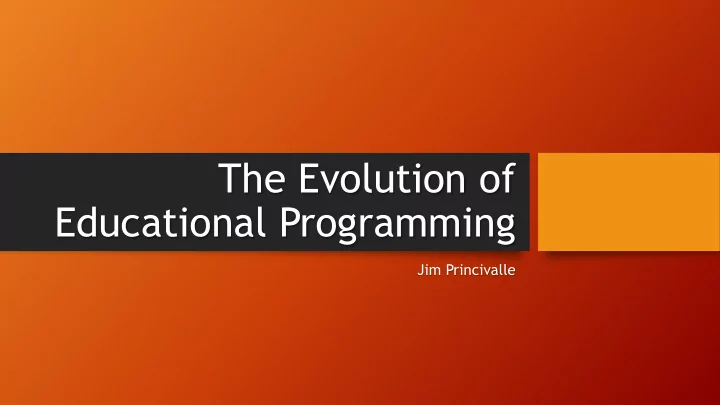

The Evolution of Educational Programming Jim Princivalle
The Corporation for Public Broadcasting • The Public Broadcasting Act of 1967 • Signed into law by Lyndon B. Johnson • Established the Corporation for Public Broadcasting (CPB) • Created PBS Shortly After • PBS began a mission to provide free entertaining educational programming to our nation’s children.
Sesame Street • Began airing on PBS in 1969 • Used of cute puppets, celebrities, catchy tunes, and rapid-fire editing to capture and hold onto kids’ attentions. • Revolutionized Children’s Programming and Inspired nearly every educational program that came after it. • Has won a record breaking 167 Emmy Awards over the course of it’s 50 year run. • https://www.youtube.com/watch?v=JAB FGF8Uy4c
Education as Entertainment and Vice Versa • In his book Amusing Ourselves To Death , Neil Postman describes his concerns with the idea of presenting Education as Entertainment. • He believed Sesame Street “encourages children to love school only if school is like 'Sesame Street‘” • His concerns were mostly based out of: • A child cannot ask questions of what is presented on television; • learns more about images than about language; • and is held to no standards of social behavior or expectation.
“Stickiness” • Conversely in his 2007 book The Tipping Point , Malcolm Gladwell mostly agrees with Postman. • He believes Sesame Street was constructed in such a way that a child could obtain the largest amount of information in the shortest amount of time. • As a result of that Gladwell believed that Sesame Street does not meet the necessary requirements to provide students with an education that is “sticky.”
“Stickiness” (Continued) • Stickiness refers to the idea refers to how children learn as opposed to what exactly it is they’re learning. • What Gladwell believed educational programming required to be “sticky” is as follows: • Stories are the primary method for children to make sense of their world. • Repetition, Repetition, Repetition. • Children learn better when they can participate in the process and feel involved in the goings on of the show. • Perhaps most importantly: Children have a longer attention span than the creators of Sesame Street initially believed, and under the right circumstances a young child would be more than willing to sit for an unfragmented half hour program.
Blue’s Clues • Blue’s Clues is Gladwell’s perfect idea of a “sticky” show. • It began in 1996 on NickJr., and really changed the format for educational programming. • It followed the adventures of Steve and his puppy Blue in their home as Steve worked with the audience to figure out whatever mystery Blue had laid out for him that week. • The show used constant engagement with its audience, matched with repetition and fun to teach important lessons in problem solving. • To Gladwell, Sesame Street threw information at children, whereas Blue’s Clues taught children how to think. • https://www.youtube.com/watch?v=34iAB-aaHcQ
Blue’s Clues (Continued) • Blue’s Clues created a new format of educational programming that created dozens of imitators that persist to this day. • Sesame Street and Blue’s Clues together form the two foundational pillars of virtually every program that seeks to provide children with a foundational education.
Educating Older Children • What does educational programming start to look like as children get older? • When Children have aged beyond the need for a foundational education of reading and math and problem solving, where do you take them?
Social Education • Since the 1990s, we’ve seen a boom in shows aimed at older children that wouldn’t necessarily be seen as “educational” • However, despite these shows not teaching children reading or math. These shows have dared to teach lessons of: • Sexual/Gender Identity • Abusive Relationships • Absent Parents • Death • Personal Responsibility
Examples • https://www.youtube.com/watch?v=IuYwQI9keJ4 • Unhealthy/Abusive Relationships in Steven Universe • http://watchcartoonsonline.eu/watch/hey-arnold-s5-ep6-parents- day/ @ 08:30 • Embracing Non-Traditional Families in Hey Arnold • https://www.youtube.com/watch?v=aYkuuu9u3EI • Taking responsibility for your life and making your own choices in Avatar the Last Airbender
Questions: • What educational programs did you watch growing up? • What shows (educational or not) taught you important life lessons? • Would you consider these shows aimed at older children that I’ve laid out should be considered “educational?”
Recommend
More recommend